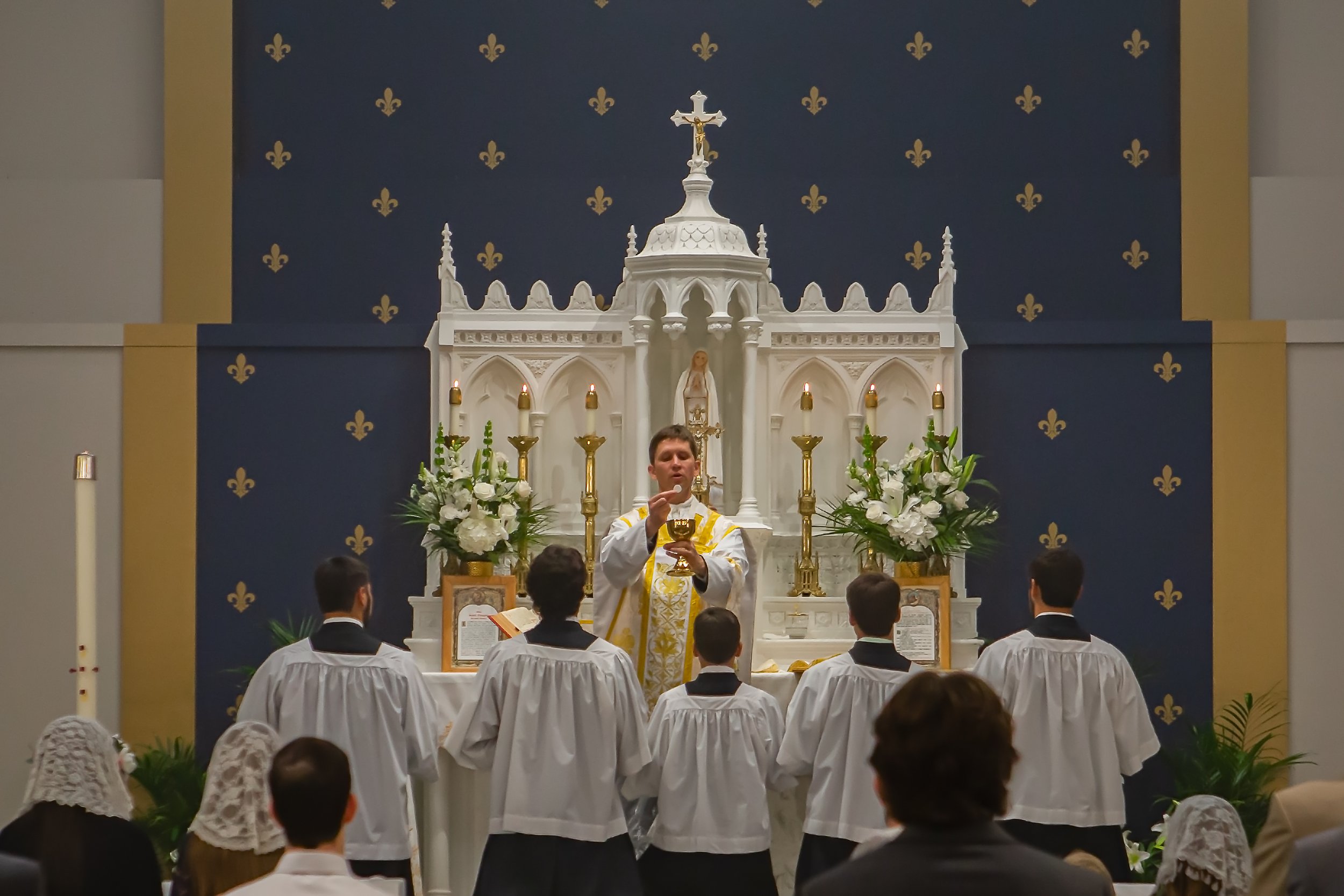About Us
Our Lady of Fatima

Contact Info
Our Lady of Fatima
66110 Vortisch Road
Lacombe, Louisiana 70445
(985) 377-9895
Pastor: Fr. Luke DeMeyer
Queen of Angels Priory
Dickinson, Texas | (281) 337-2508
Sacramental emergencies | (626) 698-8690
Society of St. Pius X
News:
What is the Tridentine/Latin Mass?
The Tridentine Mass (Latin: Missa Tridentina) is the form of the Roman Rite Mass contained in the typical editions of the Roman Missal that were published between 1570 and 1962. Other names for it include Traditional Mass, Traditional Latin Mass, and, in its latest form, Mass according to the 1962 Roman Missal. It is widely referred to as the Latin Mass.

WHAT DO TRADITIONAL CATHOLICS BELIEVE?
Traditional Roman Catholics profess and adhere to everything which is contained in divine revelation, whether written or handed down, and which has been proposed by the Church as having been revealed by God either by her solemn judgment or by her ordinary and universal magisterium.
Because of our adherence to the magisterium of the Church, we wholeheartedly reject the heretical teaching of Vatican II concerning the unity of the Church, namely that the Church of Christ is not exclusively identified with the Catholic Church, but merely subsists in it. This heretical doctrine is contained principally in Lumen Gentium, and its heretical meaning is confirmed in statements of Paul VI and his successors, particularly in the 1983 Code of Canon Law. It is contrary to the teaching of the Catholic Church, contained principally in Satis Cognitum of Pope Leo XIII, Mortalium Animos of Pope Pius XI, Mystici Corporis of Pope Pius XII and in the condemnations of the “Branch Theory” made by the Holy Office under Pope Pius IX.
We also reject the teaching of Vatican II concerning ecumenism as overtly heretical, which states that non-Catholic religions are a means of salvation. This doctrine directly contradicts the teaching of the Church that there is no salvation outside the Catholic Church, called by Pope Pius IX a “most well-known Catholic dogma.” In addition, the ecumenical practices which have resulted from this heretical doctrine are directly contrary to Mortalium Animos of Pope Pius XI.
We reject the teaching of Vatican II on religious liberty, contained in Dignitatis Humanae, which nearly word for word asserts the very doctrine which was condemned by Pope Pius VII in Post Tam Diuturnas, by Pope Gregory XVI in Mirari Vos, by Pope Pius IX in Quanta Cura, and by Pope Leo XIII in Libertas Praestantissimum. The teaching of Vatican II on religious liberty also contradicts the royalty of Jesus Christ in society as expressed in Quas Primas of Pope Pius XI, and the constant attitude and practice of the Church with regard to civil society.
Traditional Catholics furthermore reject the teaching of Vatican II concerning collegiality, which attempts to alter the monarchical constitution of the Catholic Church, with which she was endowed by the Divine Savior. The doctrine of Vatican II, confirmed by the 1983 Code of Canon Law, which states that the subject of the supreme authority of the Church is the college of bishops together with the pope, is contrary to the defined doctrine of the Council of Florence and of Vatican I.

Traditional Catholics adhere to the pre-Vatican II Catholic liturgy.
Consequently true Catholics reject the Ordo Missae of Paul VI as an evil liturgical discipline, because (1) it contains a heretical definition of the Mass; (2) it was composed with the express purpose of making an ecumenical liturgy, pleasing to Protestants, stripped of Catholic truths concerning the priesthood, the Holy Sacrifice of the Mass, and the Real Presence of Christ in the Holy Eucharist; (3) it was composed with the help and input of six Protestant ministers, which shows the heretical spirit in which it was conceived and formulated; (4) its authors systematically deleted from its prayers and lessons doctrines which would be offensive to heretics; (5) it teaches, both by its omissions and its symbolism and gestures, heresies and errors concerning the priesthood, the Holy Sacrifice of the Mass, and the Real Presence of Christ in the Holy Eucharist; (6) owing to a defect of intention which it causes in him who celebrates it, the validity of the consecration is put into such doubt that traditional Catholics must consider it to be an invalid “Mass”, which cannot be pleasing to God and cannot fulfill ones Sunday obligation.

